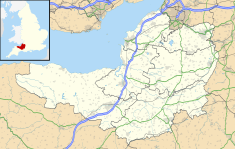Clapton Court
| Clapton Court | |
|---|---|
 The north front showing the porch tower | |
| Location | Clapton in Gordano, Somerset, England |
| Coordinates | 51°27′28″N 2°46′07″W / 51.4579°N 2.7686°W |
| Built | 15th century |
Listed Building – Grade II | |
| Official name | Clapton Court |
| Designated | 20 January 1986[1] |
| Reference no. | 1129089 |
Listed Building – Grade II | |
| Official name | Entrance archway about 25 metres northwest of Clapton Court |
| Designated | 20 January 1986[2] |
| Reference no. | 1321002 |
Clapton Court is a Grade II listed building,[1] in Clapton in Gordano within the English county of Somerset.
Local lords of the manor, the Arthur family originally built on the site. The current porch tower remains from the 15th-century house; the rest was added in the 17th and 19th centuries. It has been owned by many local gentry, but changed from mansion house to farmhouse.
History
[edit]The first manor house on the site was built by Sir William Arthur in the 13th century. Sir Thomas Arthur was the member of parliament for Somerset in the 1390s.[3] In the 14th century his descendant Richard Arthur added to the house.[4] He married Alice the daughter of James Berkeley, 1st Baron Berkeley and the entwined coats of arms of the two families appear on the entrance porch.[5] Edward Arthur died in 1592, his daughter married William Winter (or Wynter) of Dyrham Park and the house was passed down in the Winter family.[4] Their tombs can be seen in the neighbouring Church of St Michael.[5]
Subsequent owners included: James Davis, who was a mine owner in the Victorian era, Sir Edward Payson Wills, 1st Baronet of Hazelwood & Clapton in-Gordano, of the Wills baronets,[6] who was a director of the family business, WD & HO Wills. In the late 19th century the court was owned by his son Sir Ernest Wills, 3rd Baronet, who was a director of the Imperial Tobacco Company , ( formally W.D.& H.O. Wills ) the tobacco importers. It was then bought by Lady Smyth of Ashton Court and subsequently by Con Stevens.[5] During the centuries the house moved from being a mansion house to a farmhouse and had various renovations and extensions.[7]
In 2009 planning permission was gained to demolish some of the farm buildings and convert others into holiday homes and offices.[8]
Architecture
[edit]The house has red sandstone walls, which are supported by buttresses in the northeast corner.[9] The oldest part of the building is the 15th-century three-storey porch tower at the north front of the house.[1] The rest of the building is of two storeys and dates from the 17th and 19th centuries.[9][1]
A 13th-century wooden screen from the house has been in the Church of St Michael.[10]
The archway entrance was built in the late 17th or early 18th century.[2]
References
[edit]- ^ a b c d Historic England. "Clapton Court (1129089)". National Heritage List for England. Retrieved 4 February 2017.
- ^ a b Historic England. "Entrance archway about 25 metres north west of Clapton Court (1321002)". National Heritage List for England. Retrieved 4 February 2017.
- ^ "ARTHUR, Sir Thomas (d.c.1404), of Clapton-in-Gordano, Som". The History of Parliament. The History of Parliament Trust. Retrieved 5 February 2017.
- ^ a b "Arthur of Clapton Court". Landed families of Britain and Ireland. Retrieved 5 February 2017.
- ^ a b c Cooke 1957, p. 27.
- ^ "Parish History". Clapton in Gordano. Retrieved 5 February 2017.
- ^ Cooke 1957, pp. 27–28.
- ^ "Weekly list of Planning Applications Decided by North Somerset Council For the week 27 April 09 – 1 May 09" (PDF). North Somerset Council. Archived from the original (PDF) on 7 June 2011. Retrieved 26 November 2009.
- ^ a b Cooke 1957, p. 28.
- ^ Bailey, Jill (2 March 2006). "Weston was sold to pay gambling debts". Weston, Worle & Somerset mercury. Retrieved 28 December 2017.
Bibliography
[edit]- Cooke, Robert (1957). West Country Houses. Batsford.

